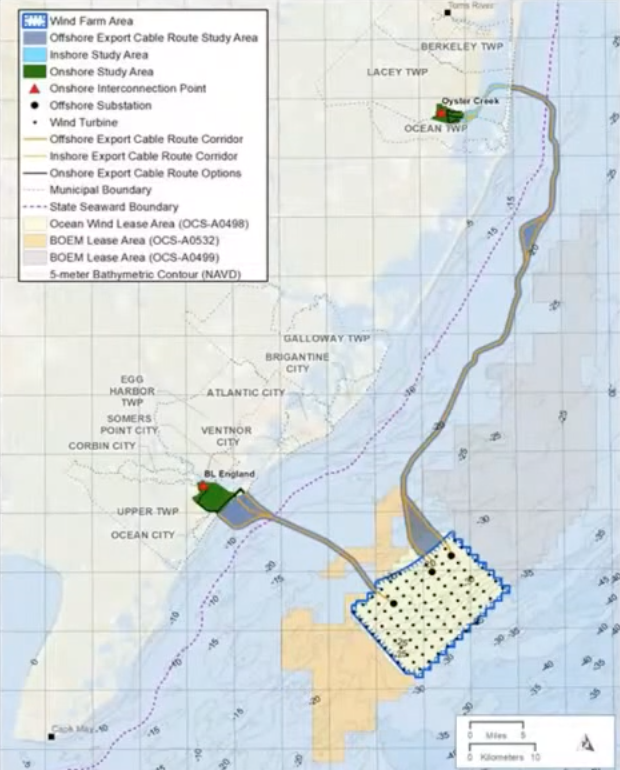The planned Ocean Wind 1 energy project “is likely to adversely affect, but is not likely to jeopardize” threatened and endangered sea life when the 1,100-megawatt turbine array is built off New Jersey, according to the National Oceanic and Atmospheric Administration.
NOAA’s National Marine Fisheries Service is issuing a final biological opinion under the federal Endangered Species Act, as part of the Bureau of Offshore Energy Management’s review of plans for up to 98 turbines by wind developer Ørsted on its lease about 15 miles off Atlantic City, N.J.
In a brief statement Tuesday morning, NMFS said it “has evaluated BOEM’s analysis of the effects of this project on endangered and threatened species, as well as the best scientific and commercial data available, and has concluded that the proposed action is likely to adversely affect, but is not likely to jeopardize, the continued existence of any species of ESA-listed whales, sea turtles, or Atlantic sturgeon or destroy or adversely modify any designated critical habitat.”
Critically, the opinion states that highly endangered North Atlantic right whales – a population now estimated to number few more than 340 animals in all – could have their behavior disrupted, but not be injured by activity around the wind project.
Right whales are closely tracked by NOAA and whale researchers during their movements offshore, and have frequently been noted in waters near East Coast wind leases.
“We do not expect any right whales to be exposed to increased sound levels that would result in injury; all effects to right whales will be limited to temporary behavioral disturbance,” the agency stated. “Additionally, no effects to the features of right whale critical habitat are anticipated.”
NOAA and BOEM have come under intense pressure from offshore wind critics since December, with a series of humpback whale strandings on Mid-Atlantic beaches. Wind project opponents contend the whales could have been affected by survey vessels working on wind power sites.
The federal agencies have rejected that claim, but the conflict has drawn intense interest from Republican members of Congress who are promising to hold hearings on the offshore wind permitting process.
Work on Ocean Wind 1 and other projects off the East Coast is progressing under NOAA “incidental take” permits, recognizing that survey and construction activities can affect protected species. The permits allow unintentional effects that NOAA classifies as “level B harassment” that can disrupt animals’ behavior, but not cause injuries.
Measures taken by BOEM and Ørsted to reduce and monitor those effects are included in the biological opinion’s incidental take statement, according to NMFS.
The full biological opinion document is expected to be released soon through BOEM's online pages. A spokesperson for NMFS said it will be posted to the online NOAA online library repository about 10 days after it is signed.







